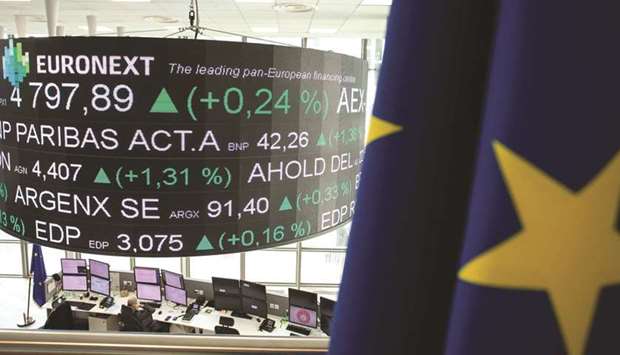With the pandemic-induced recession slowly receding, cheaper stocks in Europe are finally outperforming shares of fast-growing companies, and an increasing number of fund managers say that, after plenty of false starts, this time the rotation may only be in its early days.
The region’s heavier weighing in value stocks has been a drag for the past 10 years, causing the continent’s markets to lag behind the US But a shift began in late October, and picked up pace in November with the looming availability of Covid-19 vaccines that promise something resembling normal life in 2021.
“Value has led the market’s recovery coming out of every one of the last 14 global recessions,” said Ian Butler, who invests in international stocks for JP Morgan Asset Management. In the past when value has fared as badly as it has recently, “in each case it has bounced back with a vengeance; this sets a strong historical precedent,” he said.
For much of 2020, with earnings growth hard to come by, investors snapped up shares of companies that could increase profits despite the recession: Think lockdown winners like Sweden’s Sinch AB, a provider of the automated messages which tell you a taxi or parcel is on the way, or German meal-kit company HelloFresh SE, the year’s two best performers in the Stoxx Europe 600 Index through late October. Meanwhile, stocks that were cheap relative to earnings or book value lagged behind.
That got turned on its head in late October, as investors began pricing in the end of political uncertainty in the US and then successful vaccines. The MSCI Europe Value Index is up 23% since October 29, while its growth counterpart is up only 8.4%.
Should that persist, it would argue for investors pouring more money into Europe, where the weighting of value stocks is heavier than into other markets. Over the past 20 years, the outperformance of value often coincided with the outperformance of Europe.
“Europe is a value market while the US is a growth market, simply speaking,” said Kasper Elmgreen at Paris-based fund manager Amundi SA. “A scenario where value does well relative to growth benefits Europe in my view.”
A synchronised economic recovery will make growth stocks less appealing, said Luca Paolini, chief strategist at Pictet Asset Management. As a result the firm is “slowly adding a little bit of value” to its asset allocation, he said.
Since the aftermath of the global financial crisis a decade ago, value has underperformed growth relentlessly, as falling interest rates made fast-growing businesses more attractive than steady ones by boosting the value of their future earnings. Every single attempt at a value comeback has been short lived, and this one will falter too unless rates head back up, said Pictet’s Paolini. “The precondition for a solid and sustainable (value) rally is not only synchronized growth but also a sustained increase in bond yields, because without that we will still be kind of thinking, is it for real or is it not,” he said.
To find the last long period of value outperformance, investors have to go back to the beginning of the century.
Back then, value had underperformed growth for at least five years during the internet mania of the late 1990s, especially in the US But when the technology bubble burst in 2000, it was the start of a six and a half years of leadership for cheap stocks.
More recently, the last episode was in the aftermath of the global financial crisis, when value outperformed growth for about six months, led by a rebound in bank shares.
The stars are aligned this time for a possible multiyear outperformance by value, according to Amundi’s Elmgreen. Value stocks are at “an attractive starting point” in valuation, both in absolute terms and compared to growth, at a time when the economic rebound “will be very meaningful,” he said.
Some fund managers are sceptical that the move is durable. They point to the multiple failed attempts of value stocks to take the lead in the past, as well as the necessity to find profit growth in the long term. There are several headwinds ahead, according to Kevin Thozet, member of the investment committee at Carmignac Gestion, such as the dependence on government actions and poor earnings visibility until the vaccine is widely available, while tailwinds like financial conditions and bullish sentiment are likely to fade.
“Both aspects are casting doubt over the sustainability of value stocks’ recent streak,” Thozet said.
The world is slowly coming out of a pandemic that triggered one of the largest falls in global growth in history, and the economy is expected to bounce back next year. The unprecedented response from governments and central banks should also help boost inflation, which is still stuck in negative territory, and that in turn would help value stocks along. The thinking is that with inflation, investors would prefer the more immediate return from value stocks, many of which pay dividends, rather than the promise of hypothetical future growth.
In the short term, Citigroup strategists recommend value because financial markets should price in higher inflation expectations.
After that, though, there are structural headwinds for reflation that don’t bode well for inexpensive stocks over the longer term, they wrote in a report last week, citing risks such as potential collapses in house prices, financial assets or the oil price.

Share price information is displayed on a screen hanging over the Euronext Paris Stock Exchange trading floor.
